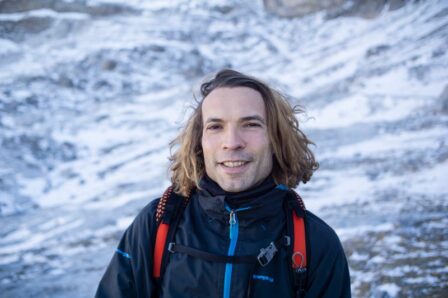Evil Is Always Human, with José Luis Espejo

The shared history of whales and humans is one of the most popular stories of the 20th century. What for some humans in Europe is an almost mystical fascination, for a few others in the Arctic Circle is a relationship of survival. And this is a relationship that spans millennia. Between the lines of these stories, there is an unexpected narrative about human listening and vision, about our capacity for attention, and about the societies that both cetaceans and humans build.
Evil Is Always Human is a personal journey that has evolved into both informal and academic research. It is a work in progress that explores the role cetacean bodies have played in shaping contemporary audiovisual culture. At Hangar, we present a new, much longer version, open to participation. It will be an afternoon to pause and listen to cetacean recordings, animated shorts, excerpts from films and texts, as well as music, patents, maps, and paintings.
The uniqueness of Evil Is Always Human lies in its adaptability across formats: it began on the pages of Zarata Fest Book in 2016, followed by a shared talk with Jessica Sarah Rinland at Curtocircuito (Santiago de Compostela, 2018) and with Susana Jiménez Carmona at Medialab Prado (Madrid, 2021). It later took the form of a larger-scale audiovisual lecture at TEA (Tenerife, 2021), CentroCentro Cibeles in Madrid, and the Consulado del Mar in Burgos (2022). It has even served as the basis for a doctoral thesis titled Medios Cetácea: ballenas, delfines, concentración y comunicación audiovisual.
This iteration of Evil is always human is part of OLLA, common research programme.
Practical information
Date: February 5th
Time: 5 pm
Venue: Sala Ricson, Hangar
Free registration via this form.
For a long time, José Luis Espejo has focused his research on the relationship between art and the culture of listening. Recently, he has begun to expand and refine his studies in media archaeology and deep-time materialism. He has studied, often thanks to scholarships, Art History and Audiovisual Communication at various universities. However, this academic path would have served him little without considering his self-taught education in Sound Studies and media archaeology, as well as his involvement in collective projects like Mediateletipos.net, UrsonateFanzine and audio-lab.
As a curator, he is particularly proud of Charivaria (2017), created with Andrea Zarza at CentroCentro, and El Observatorio de la Escucha with Mikel R. Nieto and Xabier Erkizia, as part of the European Capital of Culture in Donostia-San Sebastián 2016. He also highlights Archipiélago (2017–2023) with Rubén Coll, during a period in which he also oversaw the live arts music programming at the Museo Reina Sofía. There, he co-curated projects alongside Susana Jiménez Carmona, Agnès PE, Mattin, Sarah Rasines, Jesús Jara, and Fran MM Cabeza de Vaca.
Among his audio and text-based research are El 92 cava con todo and Cárcel de oro. Formas de la voz y la escucha entre 1939 y 1953 in RRS; Celuloide, madera, litio y silicio in Campo de relámpagos; and Escucha, por favor. 13 textos sobre sonido para el arte reciente in EX(it) Libris. His interest in Sound Studies led him to teach in 2013 for the Master’s in Music Industry and Sound Studies at Universidad Carlos III in Madrid, an activity he continues to combine with the concert series LIMO, which he co-produces under the name ULTRANESIA.
Categories: Agenda Hangar | Tags: olla
